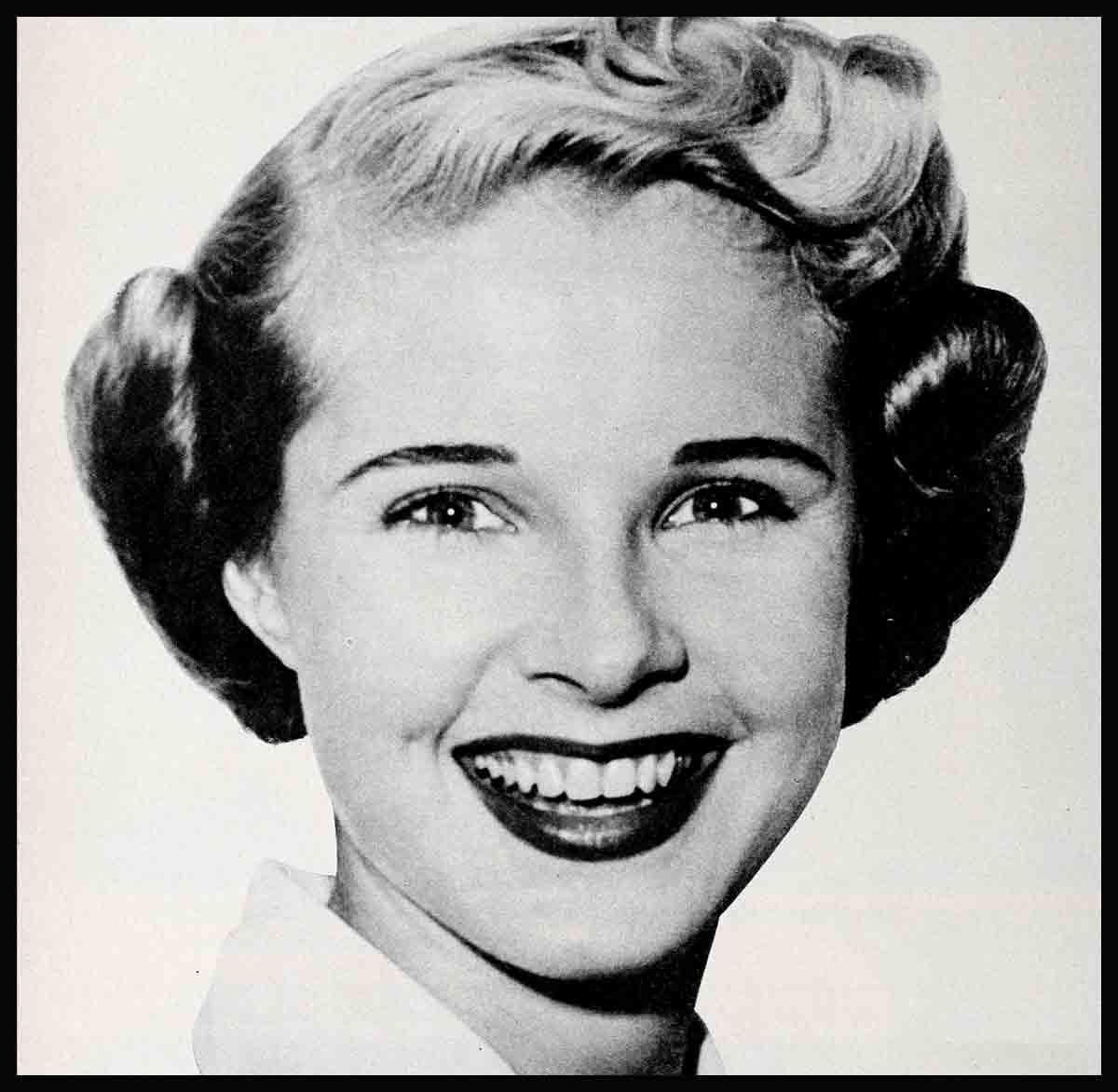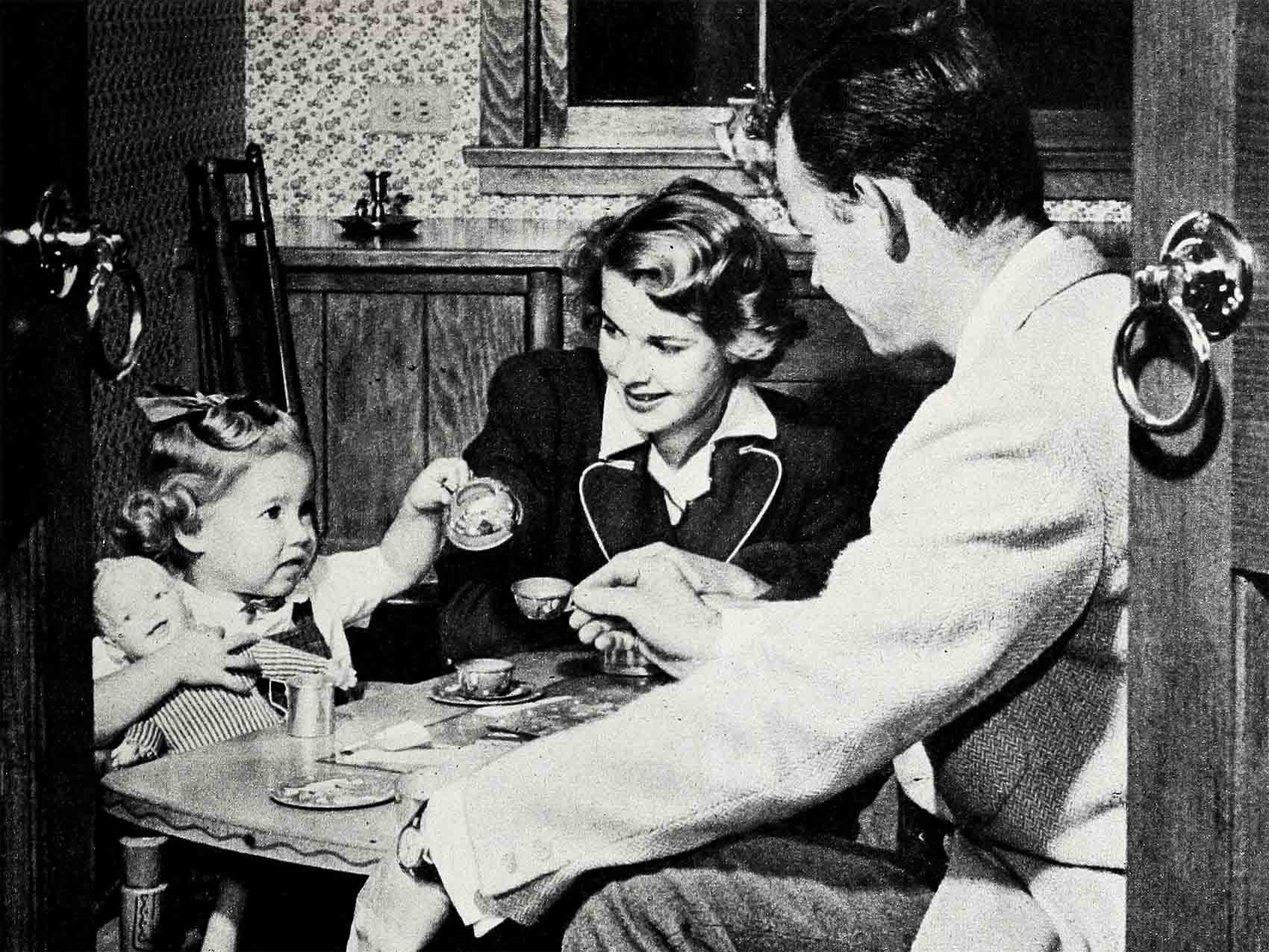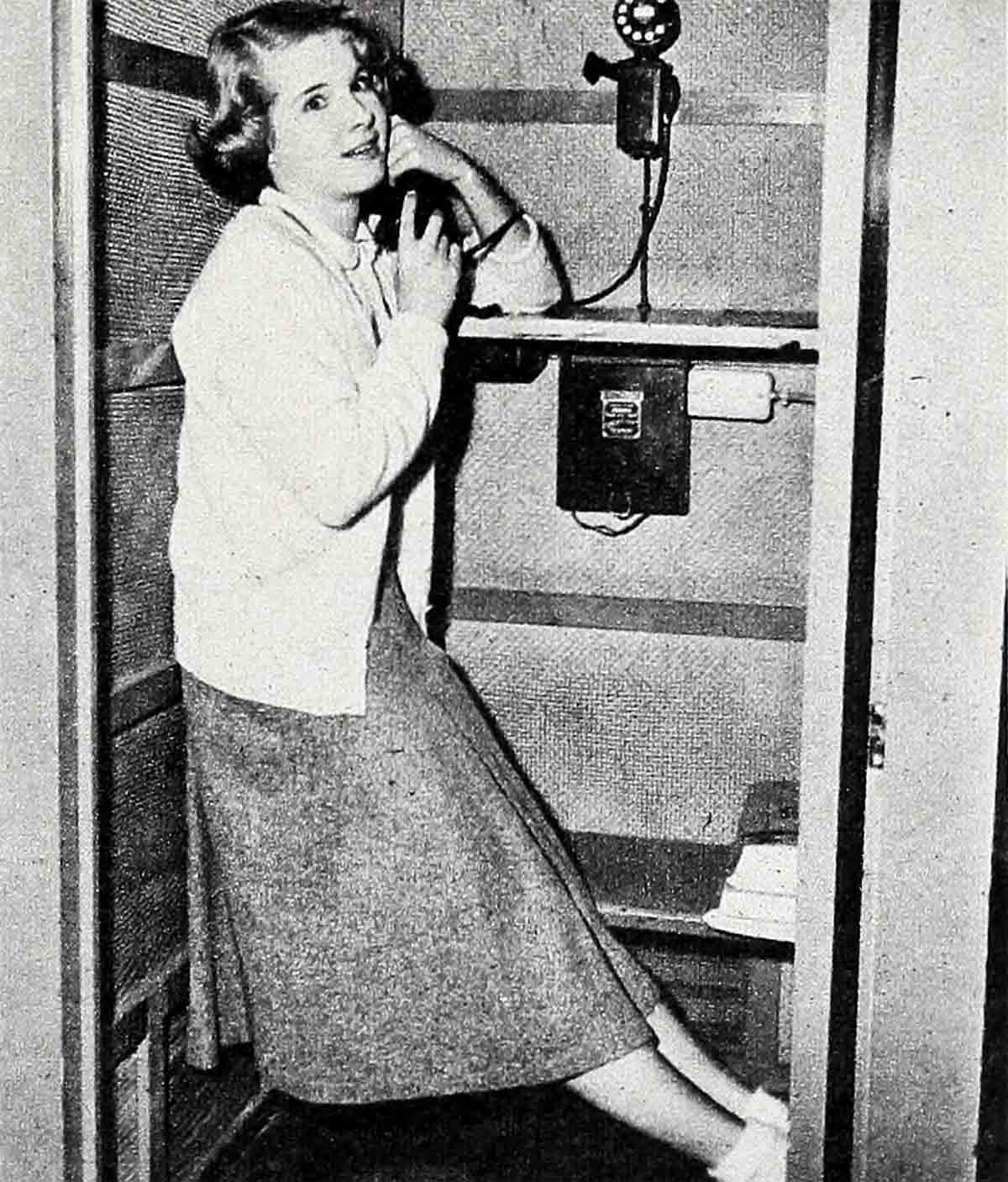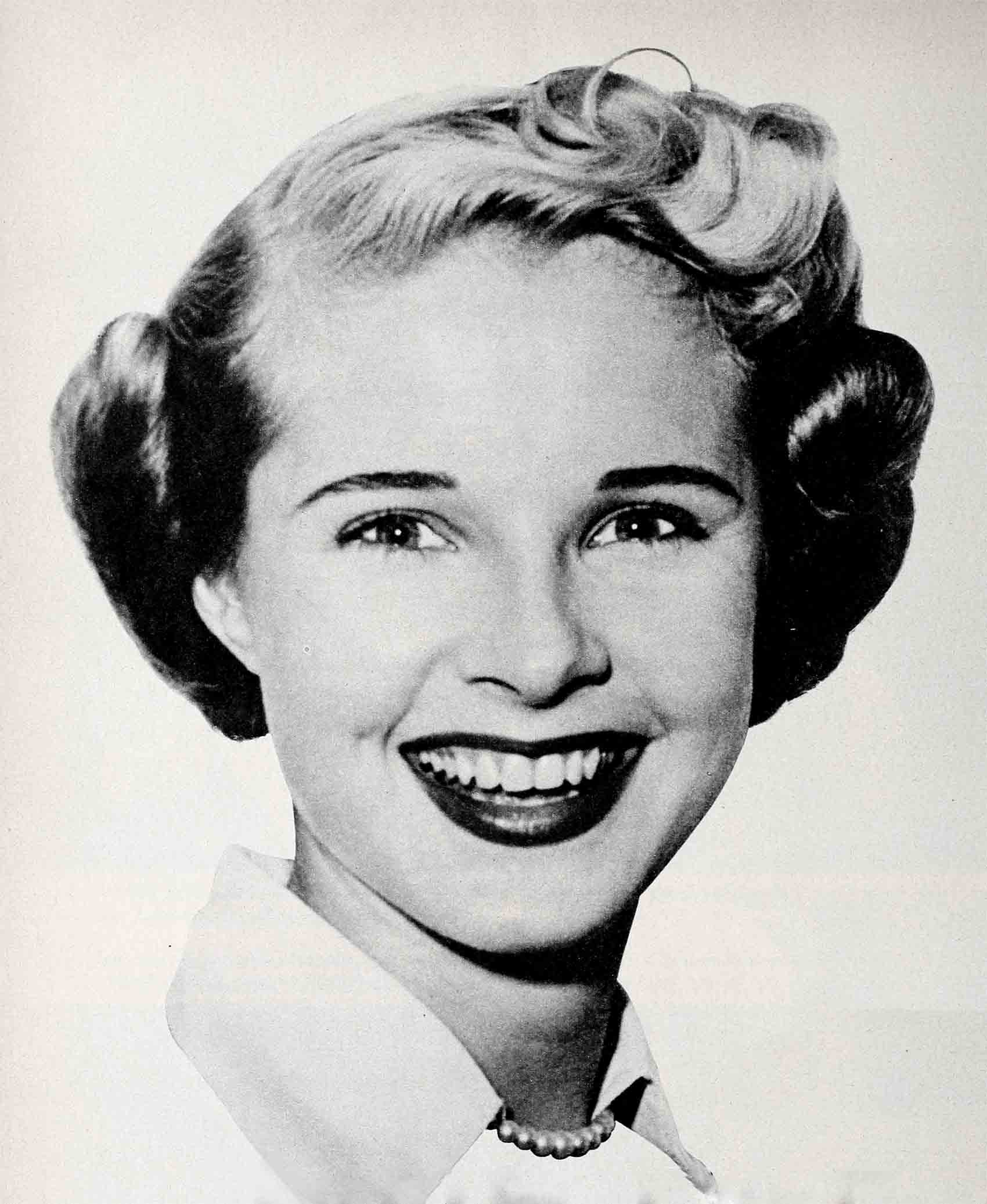
Mrs. Pat—Mona Freeman
The party to see, if you have problems, is Miss Mona Freeman. The little monster of “Dear Wife” and “Dear Ruth” will not disappoint. She is Miss Fixit in person.
Mona knows from everything and info is cheerfully imparted. She can tell you the best buys in clothes, the place you should go to on your honeymoon, the way to have the sweetest baby in this world, full of beans, and where you will find the best car and a cute redheaded guy also full of beans.
The redhead is not an accessory, he is standard equipment for Mona; he is Pat Nerney, car dealer, and she’s Mrs. Pat.
Mrs. Pat is full of frijoles herself. The best information bureau with a thirty-three bust, she’s The Traveler’s Aid, solving all problems. Mme. Mona also solves mysteries. She confronted the mystery man of Hollywood in his den at midnight. She has seen Harvey, but actually!
At age fourteen, phenomenon Freeman became a movie queen in name only. She signed a contract ghosted for a producer she had never seen and who had not seen her. She drew no salary, did no work.
It was all very lovely and mysterious.
Mona didn’t mind being a star on zero salary. Already, she was an affluent career woman. Cute as a Girl Scout cookie, she modeled kids’ clothes for New York firms while she was a frosh at Junior High in Pelham, N. Y. She made fifty dollars a week, helped support her folks and lived the opulent life of a film star, j.g., in the dazzled eyes of fellow frosh.
Apple-cheeked as a Byzantine madonna and fashioned like a doll on a French music-box, Mona popped naturally onto magazine covers. These led a talent scout to sign her unseen for the unseen producer.

Before she could get around to investigating Hollywood, she became a John Powers model with $150 a week to spend. Sears Roebuck paid her that to swoon farmerettes by wearing children’s clothes in their catalogue. Catalogue modeling is the model’s dream because you get lovely chaperoned trips to shoot pictures in places like Texas, which is very educational, models being naturally interested in scenic splendors like tall Texans with oil derricks and longhorn steers.
Model movie queen Mona toted her contract along like a souvenir dance program for prestige value. Now and then she studied the fine print to see if it said anything about money or a star dressing room. Nope.
After a year of still-life starring, Mona was rocked off her high heels by a check for four hundred dollars from her producer. It was designated for lessons in acting, which threatened to become the next Hollywood hobby after race horses and lessons in painting.
This currency cyclone whirled Mona off her beat and set her down in Hollywood. Scarcely had she bounced the boulevards than Paramount started whistling and beckoning. Mona flirted right back. It looked like a deal until Mona’s mystery man sent her a notice stating that her option would be taken up.
Mona was mad. She was tired of being left high and dry; she wanted to be a star with a swimming pool. It was time to see her invisible boss and learn what’s with him. Where could she find a Mr. Howard Hughes?
Sleuthing his phone number, Mona called and asked for an appointment. A voice on the wire eerily set midnight as the hour. It sounded fiendish. But our Miss Freeman is a dauntless cherub.
Around Hollywood it is generally known that Mr. Hughes’s office hours begin at midnight and end, presumably, when the cock crows at dawn. Anyhow, Mr. Hughes vanishes like Hamlet’s father, and awed employees, who feel his presence but never see him, refer to him as Harvey.
At the stroke of midnight, into the den of the handsome, tall, dark mystery an, bantam Mona bounced as Daniel into the lion’s den. Except that in this picture he characters were reversed, the lion breezing into Daniel’s lair.
Lioness Mona did not roar. Her policy, he states, is, “Be positive but nice as possible. You get absolutely no place being nasty. No one is interested if you are unpleasant.”

Pleasantly, but to the point, she said, “When, Mr. Hughes, are you going to produce a picture?”
“That is none of your business,” Mr. Hughes, pleasantly pointed.
“It is my business,” buzzed honeybee Freeman, nice as possible.
Mr. Hughes’s eyes had an amused, knowing glint. “I know, you want to go to Paramount. You will do nothing but stand around waiting to be discovered.”
“I won’t even get that chance if I stay with you, making no pictures,” she said, adding with female consistency that he only deducted her as a loss from his income tax. “I can’t stand to be upset. I would quit rather than be pushed around,” declaimed the Tax Deduction dramatically.
The logic was fraudulently female inasmuch as Tax Deduction was not even being pushed to work, but the delivery was pure Duse.
Bewildered by the argument but impressed by the histrionics, Mr. Hughes exclaimed, “I believe you can act!”
“You betcha I could act if you would make a picture,” said Mona, full of four hundred dollars’ worth of dramatic lessons.
Mr. Hughes, who has flown round the world in sixty seconds and licked Congressional Committees, gave up. He sold her contract to Paramount for $5,000.
As Mr. Hughes and most everyone in Hollywood knows, Miss Freeman speaks her mind even when she is on the unpopular side. She always is on the side of the persecuted, such as Republicans and Roberto Rossellini.
When the Bergman-Rossellini business was hot in Hollywood a voice rang out, “I do wish you would lay off Miss Bergman and Mr. Rossellini; no woman could resist that man, he’s divine.” When people looked around to see who put that shot, there stood Hercules Freeman.
Miss Freeman had attended a luncheon for Rossellini when he was in Hollywood. He gave the most wonderful talk, she said. No one could understand him, except Frank Capra, because Roberto spoke Italian. But Capra’s face lit, Mona says, and when he translated Rossellini’s stuff Mona felt her face lighting up. But, of course, no one noticed because Mona’s face is always lit up.

She married a pitiful Republican. Pat was just back from cleaning the Jap spots on Tarawa and even his freckles were pale. They lit up, though, when he saw Mona. Her maternal instinct was definitely not aroused. Pat had no life and Mona can’t stand people with no life. But life surged back when he saw her running around with his brother and he took her away. There were no hard feelings between the brothers, the Nerneys being Republicans with faith in free enterprise and competition in an open market.
Pat’s pa has a big auto agency but Pat. started at sixty a week and Mona, as observed, started her career at zero a week. The Nerneys are doing all right now. They just built a house for themselves and two-year-old daughter Mona II. “Sweetest baby, full of beans and a born personality.”
A nurse takes care of the baby during the day but Mona takes over as soon as she gets home from work.
They built the fireplace first and it’s so big, she says, that she can stand up inside it. Must be colossal.
“We are building a small house around it,” Mona says.
Pat of the luminous freckles dashed in to say that he had just been talking to Bob Hope and a bunch of Airedales. “They said we ought to have a roof,” he! said. “A roof will cost two, six bits. Shall. we have a roof or pay off on the mink?”
“You paid off on my mink,” said Mona. “I thought a roof came with the house.”
“This is a roof for part of the patio where we have the outdoor furniture,” Pat said. “The Airedales said it would be worth, two, six bits to protect the stuff.”
Two, six bits in the car dealer’s lingo is $275. Mona understand’s Pat’s spoken tongue. When he says he just took in a slick job with furnace and bing and live skins she knows he made a deal for a car with a heater, radio and new tires.
Pat too is bilingual. He comprehends when Mona comes home from the studio and says they threw the pan on her and hit her with baby. He doesn’t get his Irish up, thinking they’ve been abusing his wife and child; he knows she means that they put make-up on her and photographed her under the small spotlight.
The Nerney way of life is perfect, according to the Nerneys.
“No fights, all laughs,” says Pat.
Mona is spunky but not temperamental. A touchy subject with her is her age. She is always being taken for younger than she is. She got canned out of her first picture because she looked twelve in the rushes and she hasn’t forgotten the ignominy. In “Dear Ruth” she was a riot and she feared her career would suffer infantile fixation on screen.
Mona was twenty-three last June.
“You wouldn’t call twenty-three young would you?” asks Mona, pleasantly defiant.
She got an adult role in “Streets of Laredo,” and was elated to play a matron with a five-year-old child in “The Heiress.” Optimistic now, she hopes to play Grandma Moses. She hopes to be Grandma Nerney before toolong. Of course it takes time.
THE END
—BY HERB HOWE
It is a quote. PHOTOPLAY MAGAZINE JULY 1950





No Comments